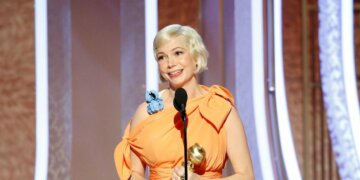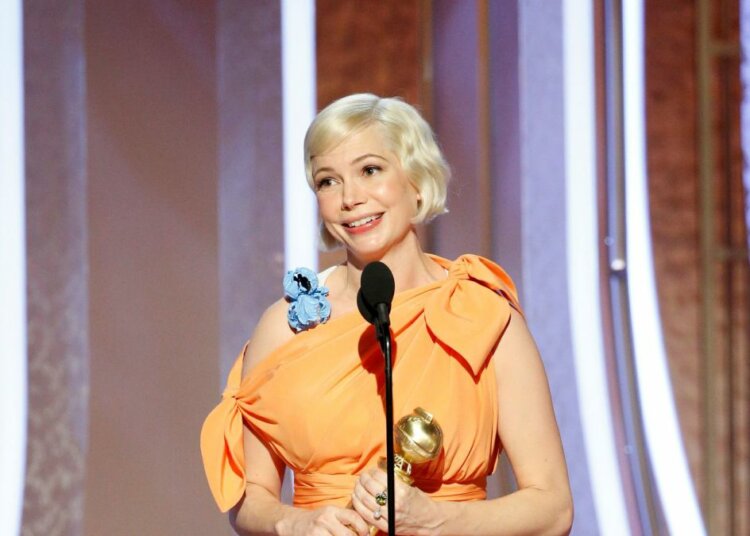[This article originally appeared in SALVO (www.salvomag.com) and is reproduced here with permission. – Ed.]
At this year’s Golden Globes, Michelle Williams made headlines for hinting that her own abortion had made her career possible.
Williams first gave a pretty self-glamorizing account of her life. The Golden Globe she received that night, she said, was somehow a validation of the choices she had made, choices both as an actor and also as a person. Because sometimes, she continued, “things happen” to women’s and girls’ bodies that they did not choose. She closed, almost in tears, “I would not have been able to do this without employing a woman’s right to choose.” To choose, she continued, when to have her children, and with whom.
The audience cheered ecstatically. The camera panned several times to an almost sobbing Busy Philipps, who has opened up elsewhere about her own abortion at age 15. Williams closed her acceptance speech urging women to vote in their own self-interest, because “it’s what men have been doing for years.”
Other women protested Williams’ one-size-fits-all approach to womanhood. The very next day, former America’s Top Model contestant and devout Catholic Leah Darrow delivered an equally tearful message on Instagram. From her hospital bed, Darrow explained that she was preparing to give birth to her fifth baby, and that delivering a video while in labor certainly hadn’t been a part of her plan. But she felt called to respond to what our culture had to say about “birth and women and babies and choice.” “Babies don’t keep us from our dreams,” she continued. “I’m getting ready to deliver a baby that will not keep me from my professional growth but will make me better because of it. And I’m so honored and excited, and I can’t wait to have this baby.”
Darrow’s message seems impossible—how can babies aid a woman’s professional growth, when seemingly every statistic out there indicates that women step down after giving birth, make less money, and forego opportunities?
It may sound crazy, but what Darrow said from her heart, her intuition, and her experience is something that studies have actually demonstrated to be true. Alissa Quart, in summarizing work from her book Squeezed: Why Our Families Can’t Afford America, found in her surveys and anecdotal experience alike that mothers reported their employment skills had actually improved after the birth of a child. Her friends “reported that fundamental workplace skills like listening, reasoning, leadership, and scheduling had enhanced their labor rather than detracted from it.” So she decided to dig into the science behind this seeming impossibility, and discovered among other things a survey of 10,000 female academics finding that mothers were more productive at work than women without children.
Other research has found that “motherhood enhances certain types of cognition, improves resistance to stress and sharpens some kinds of memory.” “The result” of pregnancy and motherhood, Craig Kinsley and Elizabeth Amory Meyer write, “is a different and in some ways better brain—or at least one capable of juggling the challenges of everyday life while maintaining a laserlike focus on the baby.”
In her own research, Amy Henderson of TendLab (whose byline is “Modern leaders need the skills parenthood unlocks”) highlights in Mother magazine five basic skills that motherhood dramatically increases: emotional intelligence, courage, resilience, productivity and efficiency, and ambition and motivation. Henderson also highlighted that in her conversations, “the majority of the moms I spoke with realized, while they were talking to me, that they were performing better in their careers because of their kids, not in spite of them.”
Does motherhood pose certain challenges to a woman’s career? Of course it does. But the narrative put forward by Michelle Williams and our culture of death is that the only way for women to succeed is to kill the babies that get in their way. Notice how passive, how victimized women seem in this narrative. “Things happen to women’s and girls’ bodies that we did not choose.” Williams says she could not have achieved her career without choosing to kill her child. I certainly don’t pretend to understand the full arc of Williams’ career, but implying that she couldn’t have overcome the birth of a child to other roles, at other times, certainly seems to be downplaying her own artistic abilities.
In the meantime, there’s a growing body of research that suggests that those women who choose to remain in the workforce in some capacity after the birth of children actually see marked improvements in their own work, whether or not those improvements are noted by others. What babies do to a woman’s brain, her motivation, her ability to multitask, empathize, prioritize, manage, be efficient, etc., is really quite remarkable.
So let’s stop downplaying it. Let’s stop caving to a culture that insists that women can only function well in the workplace if they function exactly like men do. Let’s stop accepting the victim narrative that things “happen” to women’s bodies that they are powerless over, and that the only way to make things right is to let other things into their bodies to destroy their babies’ bodies.
And let’s accept the remarkable gifts to our brains and abilities that motherhood brings.
Notes:
• Ryma Chikhoune, “Busy Philipps Opens Up About Her Abortion: ‘I Don’t Have a Shame,'” Vanity Fair, May 20, 2019, available at https://vanityfair.com/style/2019/05/busy-philipps-opens-up-about-her-abortion
• Paul Bois, “WATCH: Former ‘America’s Next Top Model’ Contestant Rebukes Michelle Williams: ‘Babies Do Not Keep Us From Our Dreams,'” Daily Wire, Jan. 8, 2020, available at https://dailywire.com/news/watch-former-americas-next-top-model-contestant-rebukes-michelle-williams-babies-do-not-keep-us-from-our-dreams.
• Alissa Quart, “The Motherhood Advantage,” Slate, June 26, 2018, available at https://slate.com/human-interest/2018/06/the-motherhood-advantage-the-evidence-suggests-that-becoming-a-mother-makes-women-better-not-worse-at-work.html.
• By Craig Howard Kinsley and Elizabeth Amory Meyer, “Maternal Mentality,” Scientific American, October 1, 2012, available at https://scientificamerican.com/article/maternal-mentality-2012-10-23/.
• Amy Henderson, “5 Reasons Why Motherhood Makes Us Better Workers,” Mother, September 12, 2017, available at https://mothermag.com/benefits-of-working-moms/.




















Discussion about this post